Conversational AI Use Cases Transforming Customer Experience
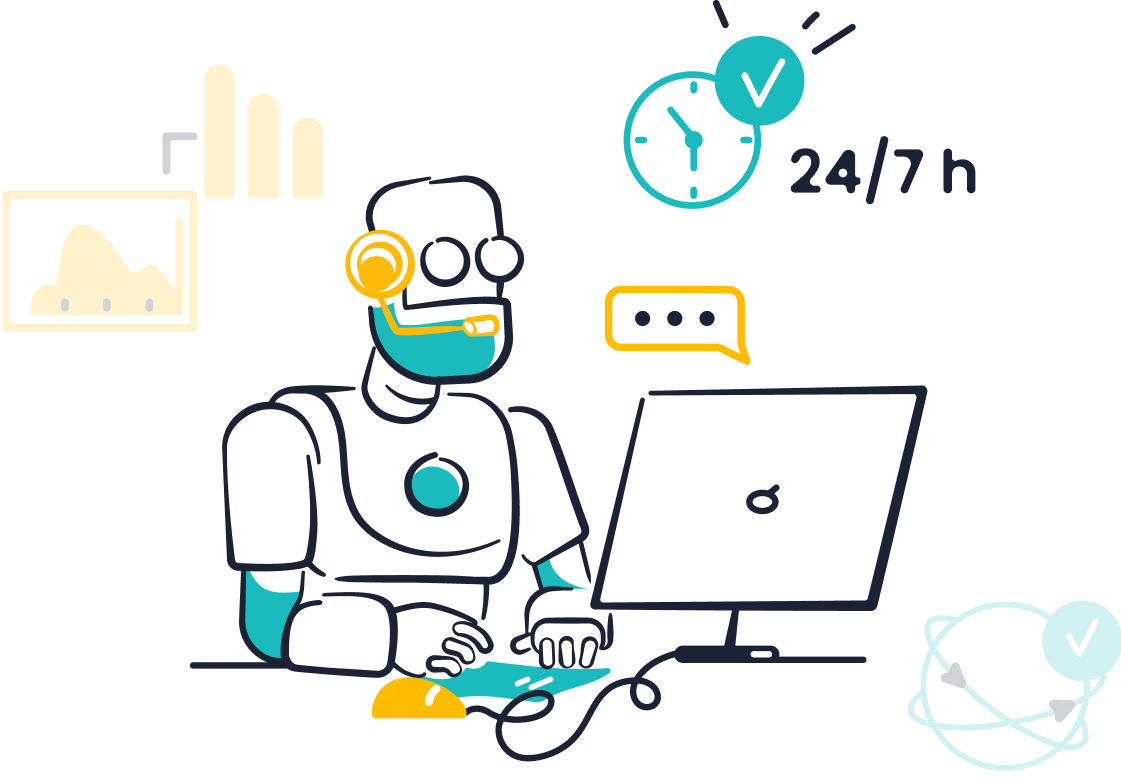
Conversational AI now shapes customer experience in 2025. Sobot leads this change with Sobot AI and Sobot call center solutions. Chatbots handle more queries than ever before, cutting average handling time by 77%. Over 73% of consumers now prefer digital channels, and 86% recognize that conversational AI improves service. Chatbots save billions of service hours, reduce support costs by up to 30%, and deliver high satisfaction rates. These conversational AI use cases show real business impact as more brands see strong returns and positive customer feedback.
Conversational AI Trends 2025
Market Growth
The global conversational AI market is expanding quickly. Industry analysts project the market will reach between $12 billion and $19 billion in 2025. The compound annual growth rate (CAGR) stands at about 22% to 24% for the next several years. This rapid growth shows how essential conversational AI has become for businesses worldwide. Companies like Sobot lead this transformation by offering advanced chatbots and omnichannel solutions. These tools help brands improve customer experience and stay ahead of new trends.
| Source | Projected Market Size in 2025 (USD Billion) | CAGR (%) (Forecast Period) |
|---|---|---|
| Fortune Business Insights | 12.24 | 22.6 (2025-2032) |
| Precedence Research | 19.21 | 23.97 (2025-2034) |
| Coherent Market Insights | 13.08 | 22.8 (2025-2032) |
| Grand View Research | 14.29 | 23.7 (2025-2030) |
The global conversational AI market is growing because more companies see the value in AI-powered customer contact.
Adoption Rates
Conversational AI trends show that adoption rates are rising across many industries. In 2025, 71% of professionals have invested in chatbots. About 79% of customer service experts consider AI automation crucial for their work. In B2B marketing, over half use chatbots to generate leads and understand their audience. Telephone companies also use conversational AI, with 52% deploying chatbots for customer support.
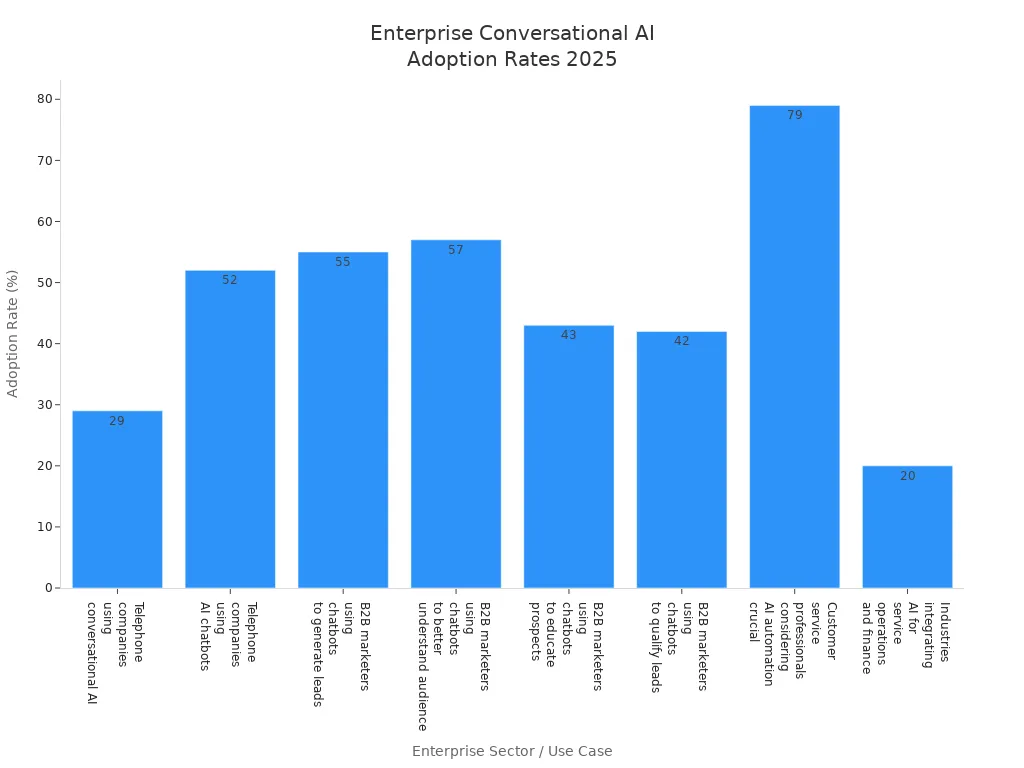
Sobot’s solutions help companies in retail, finance, and other sectors adopt these trends. Their AI chatbots support multiple languages and channels, making them a top choice for global brands.
ROI & Impact
The impact of conversational AI is clear in the latest statistics. Companies report a 25% reduction in labor costs and a 35% drop in routine call volumes. Agent productivity rises by 30%, and customer retention improves by 40%. Chatbots also help increase cross-selling and upselling by 35%. Some businesses see up to 8× return on investment by 2025. Sobot’s clients, like OPPO, have achieved high chatbot resolution rates and positive feedback, showing the real-world benefits of these trends.
Companies using conversational AI experience better efficiency, higher satisfaction, and strong financial returns.
Conversational AI Use Cases
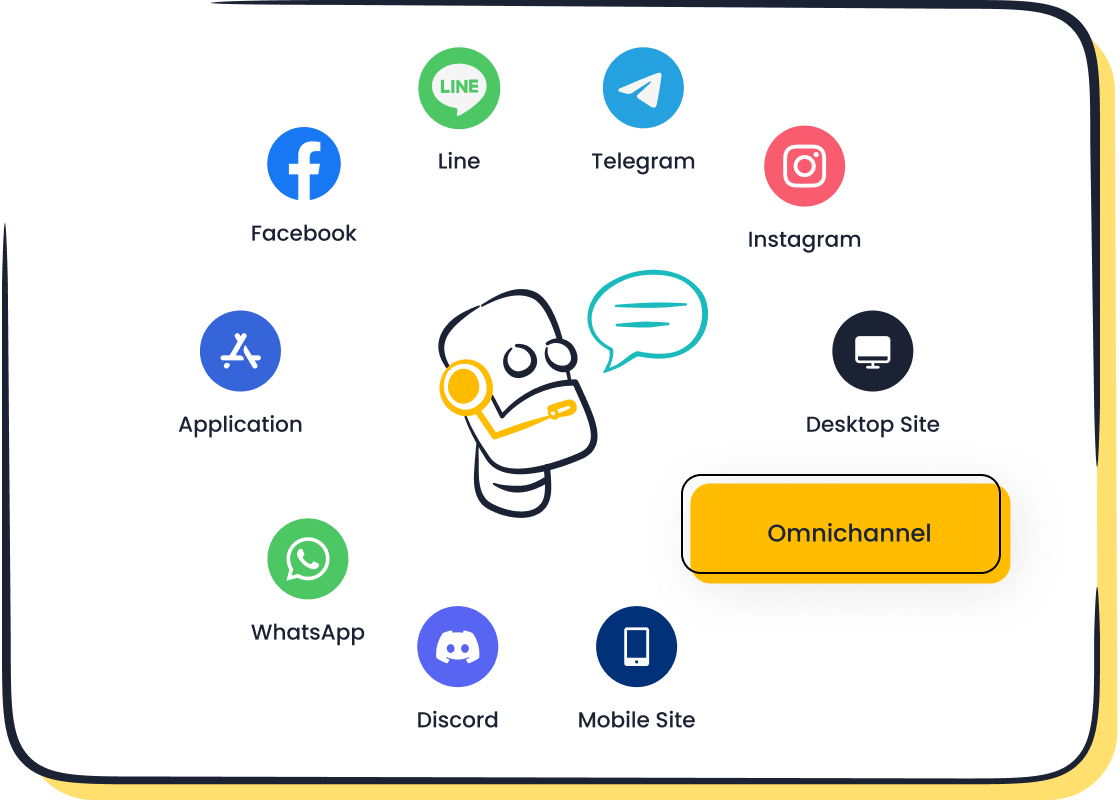
Conversational AI use cases are changing how companies connect with customers. Businesses now use chatbots, voice assistants, and AI-powered chatbots to improve customer support, drive sales, and create more personal experiences. Sobot’s solutions help brands deliver fast, accurate, and human-like dialogue across every channel. The following sections explore the most impactful conversational AI use cases and show how Sobot’s products transform the customer journey.
Customer Support
Companies rely on conversational AI to handle customer support at scale. Chatbots answer questions, solve problems, and guide users through common issues. Sobot’s AI-powered chatbots work 24/7, providing instant help and freeing agents to focus on complex cases. These solutions use smart triage, intent detection, and real-time sentiment analysis to route customers to the right agent when needed.
Sobot’s omnichannel chatbots support WhatsApp, SMS, social media, and web chat, making it easy for customers to reach support in their preferred way.
The table below shows key conversational AI use cases in customer support and their benefits:
| Use Case | Description | Benefits |
|---|---|---|
| Instant FAQ Responses | Chatbots answer common questions like password resets without human help. | Reduces wait times, increases customer satisfaction. |
| Order Tracking & Updates | Provides real-time delivery status, shipping ETA, and tracking codes. | Saves time for customers and support teams. |
| Appointment Scheduling | Lets customers book, reschedule, or cancel appointments; sends reminders via SMS/email. | Reduces no-shows, minimizes manual effort. |
| Troubleshooting Simple Issues | Guides users through basic tech support like device setup. | Decreases support tickets, speeds resolution. |
| Smart Triage & Routing | Detects intent and routes customers to the right human agent. | Improves first-contact resolution, reduces transfers. |
| Multilingual Support | Supports conversations in many languages with real-time translation. | Enables global support without large localization teams. |
| Sentiment Analysis & Escalation | Detects frustration or urgency to escalate issues to human agents. | Prevents negative experiences, improves satisfaction. |
Sobot’s partnership with OPPO shows the power of these solutions. OPPO used Sobot’s chatbot and ticketing system to manage high volumes of customer service interactions. The results were impressive:
| Metric | Outcome for OPPO using Sobot Chatbot |
|---|---|
| Chatbot resolution rate | 83% |
| Positive customer feedback | 94% |
| Increase in repeat purchases | 57% |
OPPO’s chatbot handled most queries, letting agents focus on complex requests. This led to faster responses, higher satisfaction, and more repeat business. Sobot’s integration with WhatsApp, SMS, and social media made support seamless across channels.
Sales & Marketing
Conversational AI use cases in sales and marketing help brands engage customers, qualify leads, and boost conversions. Sobot’s chatbots guide users through the sales funnel, answer product questions, and recommend items based on customer behavior. These solutions automate follow-ups, schedule calls, and send reminders, ensuring no lead goes cold.
Key ways conversational AI drives sales and marketing success include:
- Lead nurturing and qualification: Chatbots engage prospects 24/7, ask targeted questions, and schedule calls with sales reps.
- Cross-selling and upselling: AI recommends products based on browsing and purchase history, increasing revenue.
- Automated follow-ups: Chatbots send reminders after demos or purchases, keeping customers engaged.
- Campaign personalization: AI creates targeted marketing campaigns using customer data.
- Customer retention: Chatbots offer loyalty programs and personalized deals to keep customers coming back.
- Social listening: AI monitors social media, responds in real time, and gathers feedback.
- Scalability: Conversational AI handles spikes in customer activity, such as during sales events, without losing quality.
Sobot’s solutions help brands increase marketing qualified leads by up to 40% and boost conversions by 20%. During peak periods, conversational AI interactions can rise by 250% without any drop in service quality. These chatbots also provide real-time insights to sales teams, helping them make better decisions and close more deals.
Personalization
Personalization stands at the center of modern customer experience. Conversational AI use cases in this area use customer data and natural language processing to tailor every interaction. Sobot’s chatbots analyze user behavior, preferences, and purchase history to deliver relevant product suggestions and offers.
65% of consumers feel comfortable using AI for personalized services like ordering food or returning purchases. AI-driven personalization can increase revenue by up to 15%.
Sobot’s solutions help agents receive positive feedback nearly 80% of the time when using AI assistance. Chatbots deliver personalized recommendations, answer questions in a human-like dialogue, and adapt to each customer’s needs. Brands using Sobot’s conversational AI solutions see higher engagement, more repeat purchases, and improved loyalty.
Some key statistics about personalization with conversational AI:
- 52% of consumers want AI help during product experiences.
- 47% prefer receiving personalized offers through AI.
- 42% look for AI-driven product suggestions.
Sobot’s AI-powered chatbots use these insights to create more meaningful customer experiences and drive business growth.
Multilingual Service
Global brands need to support customers in many languages. Conversational AI use cases in multilingual service help companies break language barriers and reach more people. Sobot’s chatbots offer real-time translation and culturally appropriate responses, making support accessible worldwide.
About 80% of customers who use AI-powered multilingual support report positive experiences.
Sobot’s solutions deliver real-time multilingual support across chat, email, voice, and social media. For example, Agilent Technologies used Sobot’s multilingual service to achieve a 95% customer satisfaction rate and a sixfold increase in efficiency. The integration of chatbots and human agents, along with intelligent routing, helped Agilent reduce costs by 25% and improve global customer loyalty.
Sobot’s conversational AI solutions ensure that every customer receives support in their preferred language, improving satisfaction and repeat business.
Automation & Escalation
Automation and escalation features in conversational AI use cases help companies resolve issues faster and improve efficiency. Sobot’s chatbots automate routine tasks like password resets, appointment reminders, and order updates. These solutions use real-time sentiment analysis to detect frustration and escalate urgent cases to human agents.
Key benefits of automation and escalation with conversational AI:
- Automation frees agents from repetitive tasks, letting them focus on complex support.
- Real-time sentiment detection triggers adaptive scripts and automatic escalation, reducing escalations by up to 20%.
- AI-driven analytics automate call tagging, documentation, and knowledge retrieval, speeding up resolutions.
- Next-generation IVR systems and chatbots improve first-contact resolution by 25%.
- Event-triggered conversations proactively engage customers, reducing the need for calls and speeding up problem solving.
Sobot’s conversational AI solutions use these features to reduce average handle time, improve agent productivity, and deliver better customer experiences. Companies like Verizon have seen faster problem diagnosis and higher first-call resolution rates after adopting automation and escalation tools.
Sobot’s AI-powered chatbots, voice assistants, and omnichannel solutions help brands automate support, personalize service, and scale globally. These conversational AI use cases drive efficiency, cut costs, and create memorable customer experiences across every stage of the customer journey.
AI Chatbots in Customer Experience
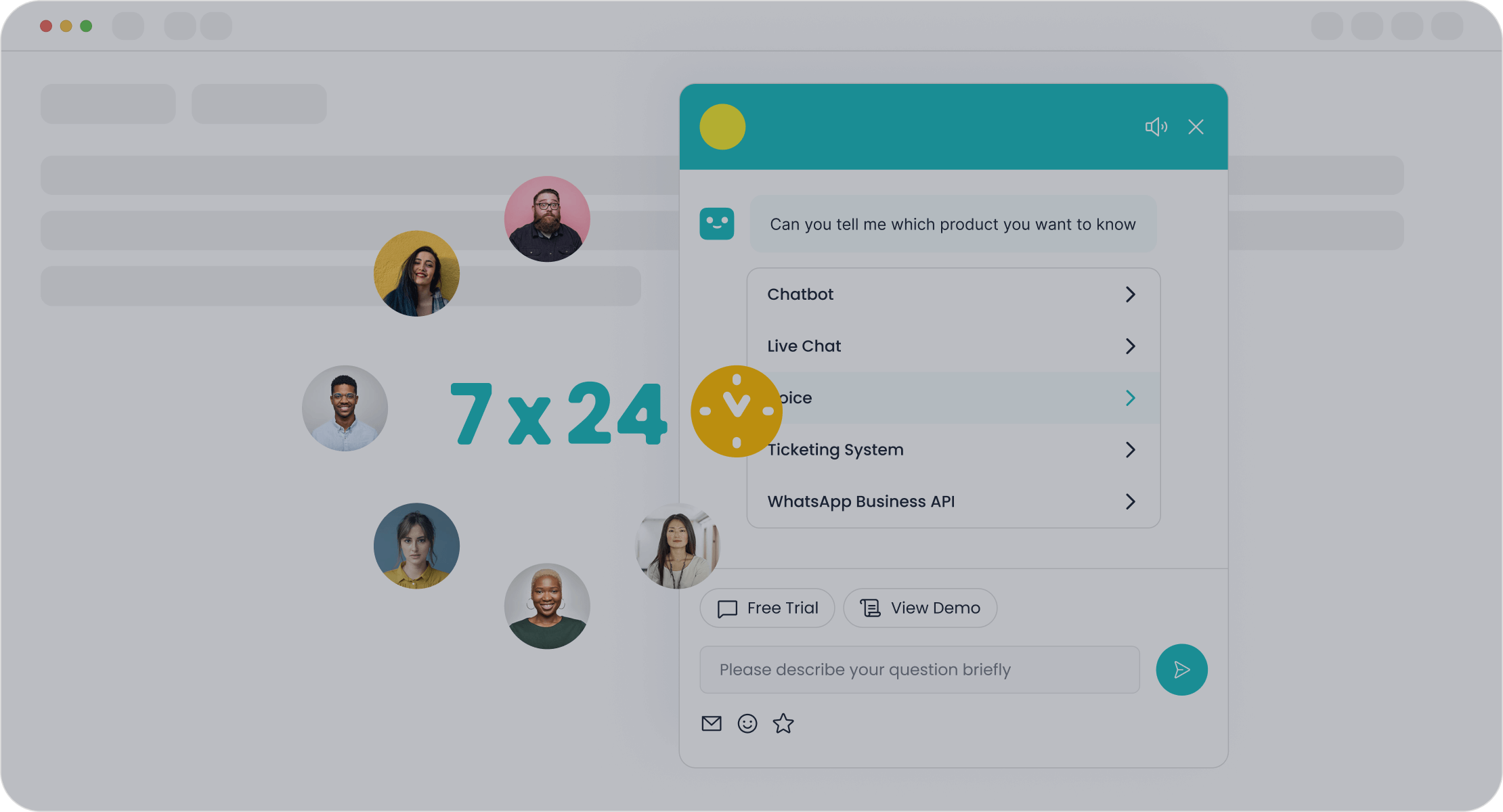
Efficiency
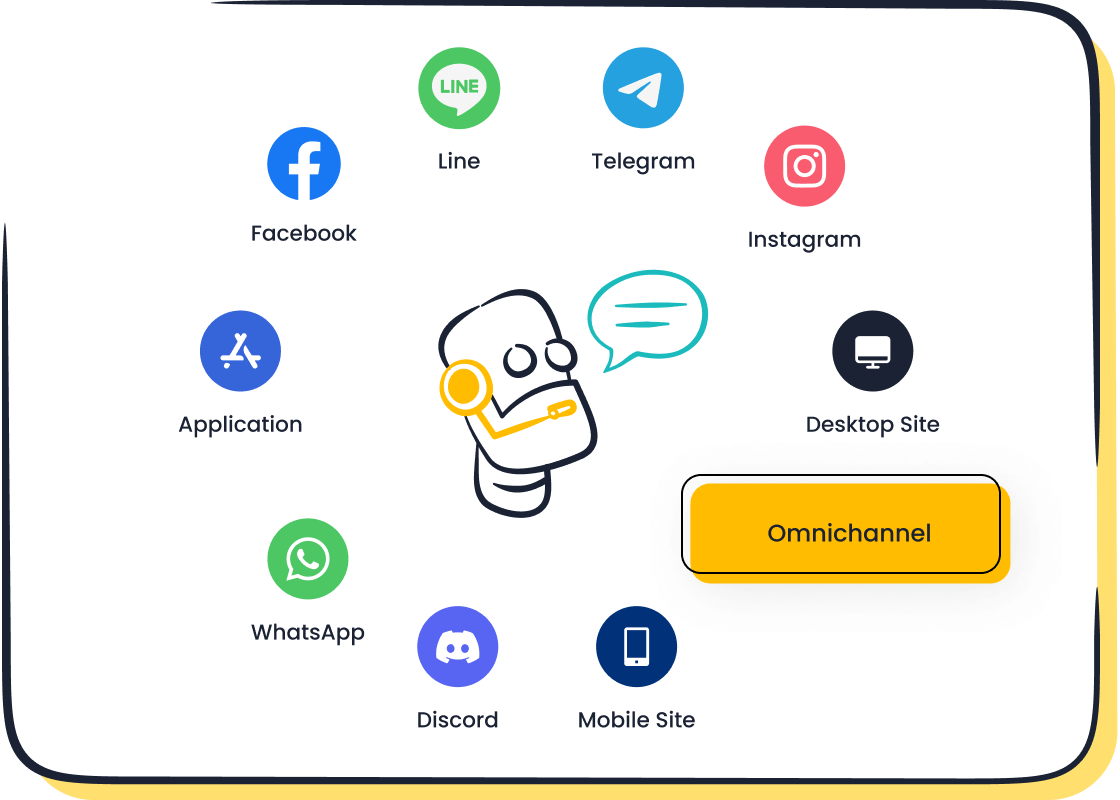
Businesses today rely on conversational ai to improve customer experience. Sobot Chatbot stands out with its omni-channel customer service workbench. This feature lets companies manage conversations across WhatsApp, SMS, email, and social media in one place. Chatbots work with human agents, making collaboration smooth and fast. Sobot Chatbot uses intelligent outbound calls and process automation to handle simple questions and automate workflows. These tools help companies save time and boost productivity. For example, Sobot Chatbot can reduce agent workload by 60% and increase overall productivity by up to 400%. Companies like OPPO and J&T Express report faster resolution times and higher customer satisfaction after using Sobot’s ai chatbots.
| Productivity Metric | Reported Gain/Impact |
|---|---|
| Hours saved annually | Up to 2.5 billion hours |
| Productivity boost | Up to 400% increase |
| Agent workload reduction | 60% decrease |
| Customer Satisfaction (CSAT) | Up to 93% |
Cost Savings
Conversational ai helps companies cut costs in customer service. Industry benchmarks show that ai chatbots reduce support costs by about 30% on average. Sobot Chatbot’s automation of routine tasks means fewer agents are needed for simple inquiries. This leads to a 50% reduction in labor costs for many businesses. Vodafone and Alibaba have seen millions in savings by using chatbots to handle most customer queries. Sobot’s chatbot functionality also provides 24/7 support, so companies avoid overtime expenses. These savings allow businesses to invest more in improving customer experience.
| Company | Industry | Cost Savings / Impact | Key Metrics / Notes |
|---|---|---|---|
| Vodafone | Telecommunications | 70% reduction in cost-per-chat | 70% of inquiries resolved by chatbot; NPS improved by 14 points |
| Alibaba | E-commerce | ~$150 million annual savings | 75% of online queries handled by chatbots; 25% increase in customer satisfaction |
| Klarna | Financial Services | $40 million profit improvement | Chatbot manages two-thirds of chats; 25% drop in repeat inquiries |
| Average | Cross-industry | ~30% reduction in support costs | Supported by first-time resolution and operational savings |
Conversion Boost
Ai chatbots play a key role in driving sales and conversions. Sobot Chatbot uses natural language processing to understand customer needs and provide instant answers. Chatbots personalize product recommendations and send push notifications to encourage purchases. In retail, ai chatbots can increase sales by up to 67%. Sobot’s chatbots help companies like H&M and Macy’s achieve higher conversion rates by offering 24/7 support and quick responses. A study found that websites using conversational ai saw a 23% increase in conversion rates. Sobot Chatbot also helps reduce cart abandonment by speeding up checkout and providing real-time assistance.
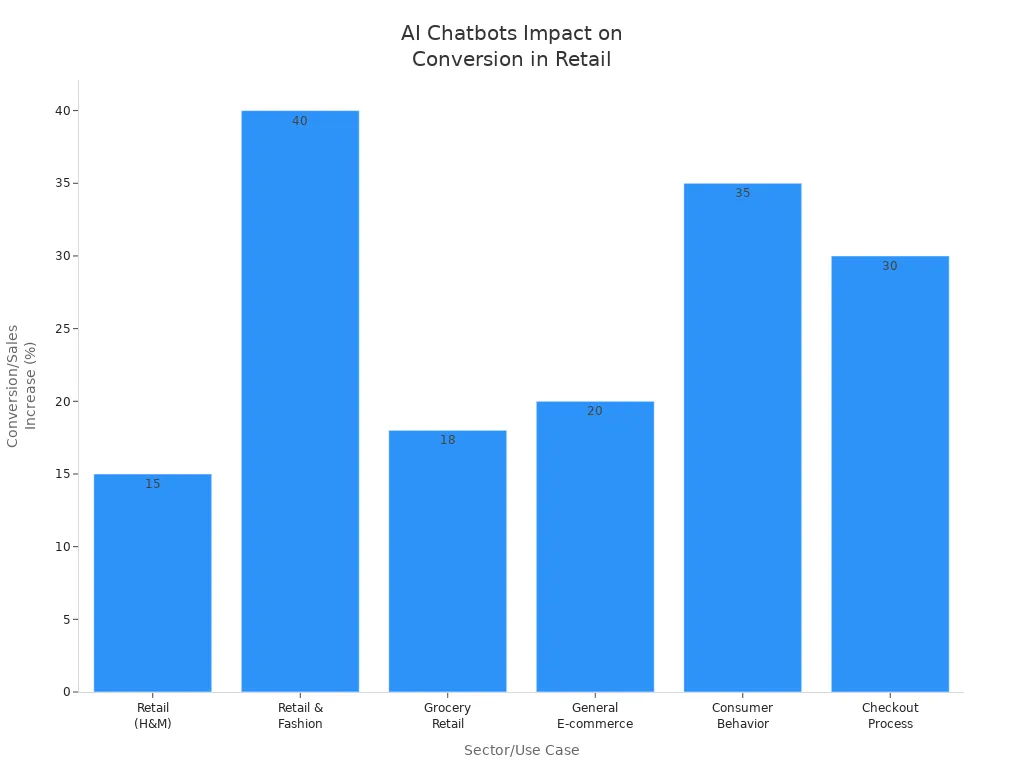
Sobot Chatbot’s advanced features—such as multilingual support, seamless integration, and easy setup—make it a powerful tool for companies seeking to improve efficiency, save costs, and boost conversions through conversational ai.
Conversational AI Market Insights
Industry Adoption
Businesses in retail, e-commerce, and finance now use conversational ai to improve customer experience. Adoption rates continue to rise as more companies see the benefits of chatbots and generative ai chatbots. Sobot serves a wide range of industries, from large enterprises to small and medium-sized businesses. This diversity helps Sobot collect valuable market insights and tailor solutions for different needs. The table below shows how conversational ai adoption varies by sector:
| Industry / Sector | Adoption Rate / Statistic | Notes / Context |
|---|---|---|
| Retail & CPG | 89% using or testing AI | Focus on customer engagement |
| Retailers | 97% plan to increase AI spending | Growing investment |
| Retailers | 39% adopt conversational AI as a top AI use case | High priority for customer service |
| Organizations (general) | 54% use chatbots or conversational AI for customer roles | Broad adoption |
| E-commerce businesses | 78% use AI in at least one function | Wide AI usage |
| E-commerce executives | 65% consider predictive AI key to growth | Strategic importance |
| Conversational commerce | $8.8 billion market value in 2025 | Rapid growth |
Sobot’s AI-powered customer service tools help businesses of all sizes improve customer engagement and gather feedback in real time.
Sector Applications
Conversational ai supports many applications across industries. Sobot’s chatbots and generative ai chatbots help businesses automate support, personalize shopping, and manage bookings. The table below highlights key applications in 2025:
| Sector | Key Conversational AI Applications in 2025 |
|---|---|
| Retail | Personalized shopping assistance, outfit suggestions, inventory checks, appointment scheduling |
| Finance | Streamlined onboarding, fraud detection, financial advice, virtual assistants, multilingual support |
| Healthcare | Telemedicine support, medication reminders, health education, emotional intelligence for mental health |
| Hospitality & Travel | Booking management, real-time updates, multilingual guest support, local attraction recommendations, issue resolution |
| Small Businesses | 24/7 customer support, booking management, professional-grade support tools |
Sobot’s solutions enable businesses to deliver these services efficiently, helping them meet customer expectations and stay competitive.
Future Outlook
The conversational ai market will see major changes in the coming years. Multimodal AI will allow users to interact through voice, text, video, and gestures, making conversations more natural. Generative ai chatbots will offer hyper-personalized experiences by adapting to user data in real time. Emotionally aware AI will help businesses respond to customer feelings, improving engagement. Sobot continues to innovate by integrating these advanced technologies, supporting global customers with multilingual and omnichannel solutions. These trends will make conversational ai more efficient, accurate, and human-like, shaping the future of customer experience.
Best Practices for Conversational AI
Implementation Steps
Businesses can follow clear steps to deploy conversational ai for customer experience.
- Start by defining the chatbot’s look and feel to match the brand.
- Integrate chatbots across websites, mobile apps, and social media for consistent engagement.
- Connect the system with CRM tools and knowledge bases to unify customer data.
- Use advanced NLP and machine learning to help chatbots understand and respond to customer questions.
- Set up seamless handoff between chatbots and live agents for complex issues.
- Enable multi-language support to reach global customers.
- Monitor performance using analytics dashboards and adjust flows as needed.
Sobot offers a visual bot builder, robust APIs, and integration with popular business tools, making these steps easier for companies of all sizes.
Optimization
To keep conversational ai performing well, companies should fine-tune chatbots with brand-specific data. This makes responses more accurate and natural. Using multi-layer caching and separating hot and cold context memory can speed up replies and reduce wait times. Regularly analyzing user data, call logs, and satisfaction scores helps identify areas for improvement. Sobot’s real-time analytics and reporting tools allow businesses to track key metrics and optimize workflows. Continuous testing and updates ensure the system adapts to changing customer needs and industry trends.
Tip: Benchmarking against industry standards helps businesses stay competitive and maintain high customer satisfaction.
Overcoming Challenges
Many businesses face challenges when adopting conversational ai. The table below shows common issues and proven solutions:
| Challenge | Description | Solution |
|---|---|---|
| Integration with Legacy Systems | Old systems cause technical problems | Use custom APIs and middleware for smooth integration |
| Lack of In-House Expertise | Teams may not know enough about AI | Offer ongoing training and use easy-to-build chatbot tools |
| Privacy and Security Concerns | Handling sensitive data raises trust issues | Apply strict data governance, encryption, and clear communication |
| Scaling AI Initiatives | Expanding beyond pilot projects can be hard | Standardize tools and plan for growth from the start |
Sobot supports businesses with multi-channel support, knowledge base management, and strong security features. Their team provides training, documentation, and 24/7 technical support to help companies overcome these challenges and succeed with conversational ai solutions.
Conversational ai is transforming customer experience by enabling hyper-personalization, automation, and real-time sentiment analysis. Sobot’s chatbots help businesses achieve faster resolutions, higher satisfaction, and up to 25% cost savings. Key market trends show rapid growth, with 65% of companies planning to expand ai use and chatbots expected to handle 95% of interactions by 2025. To succeed, organizations should invest in ongoing training, scalable ai platforms, and continuous feedback. Sobot’s solutions empower brands to optimize customer experience and stay ahead as conversational ai becomes essential for business growth.
FAQ
What is conversational AI and how does it work?
Conversational AI uses technologies like natural language processing and machine learning to let computers talk with people. Sobot’s chatbots use conversational AI to answer questions, solve problems, and help customers 24/7 across channels like WhatsApp, SMS, and web chat.
How does conversational AI improve customer experience?
Conversational AI gives instant answers, reduces wait times, and personalizes support. Sobot’s solutions help companies like OPPO achieve an 83% chatbot resolution rate and a 94% positive feedback rate. Customers get faster help and feel more satisfied.
Can conversational AI handle multiple languages?
Yes! Conversational AI from Sobot supports real-time translation and multilingual conversations. For example, Agilent Technologies used Sobot’s multilingual service to reach a 95% customer satisfaction rate and serve users worldwide.
What are the main benefits of using Sobot’s conversational AI?
Sobot’s conversational AI boosts efficiency by 70%, cuts costs by up to 50%, and increases conversions by 20%. Companies save time, reduce agent workload, and improve customer loyalty. Sobot’s chatbot works across many platforms and needs no coding.
Is conversational AI secure and private?
Sobot’s conversational AI follows strict data privacy rules. The platform uses encryption and complies with GDPR. Businesses can trust Sobot to keep customer data safe while delivering fast, accurate support.
Tip: Learn more about Sobot’s secure conversational AI solutions at sobot.io.
See Also
Ways Chatbots Enhance Customer Experience In Online Shopping
Artificial Intelligence Agents Transform The Future Of Support
Comparing The Best Voice Of Customer Software Solutions
